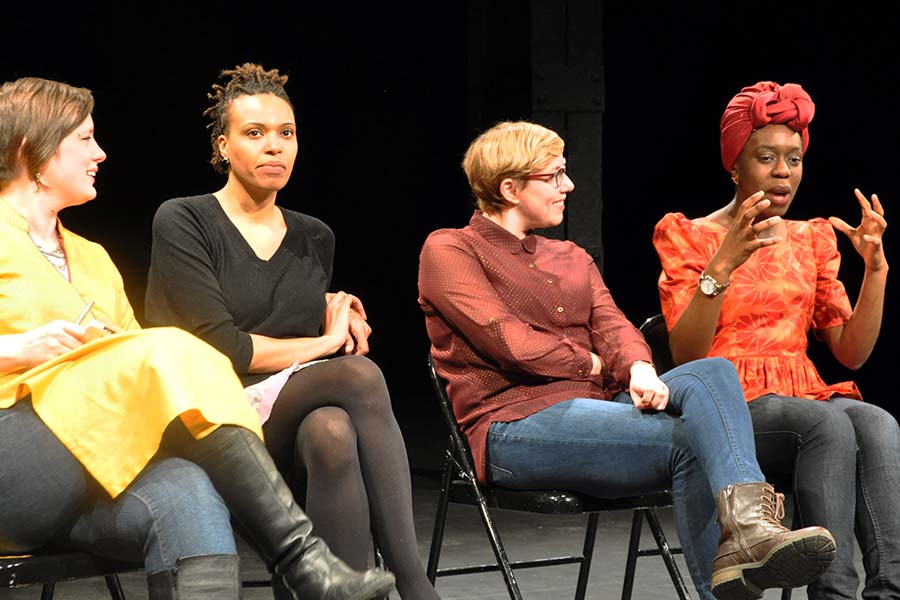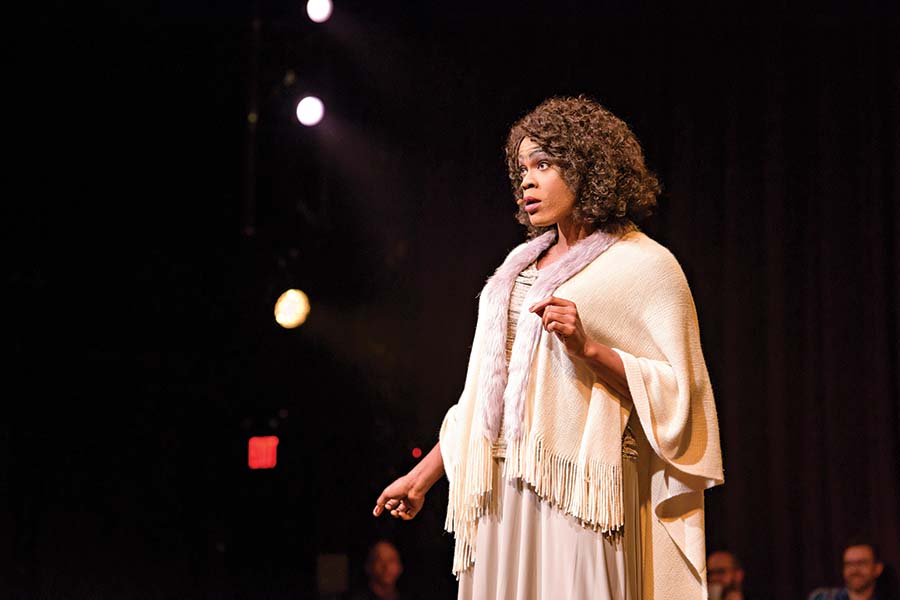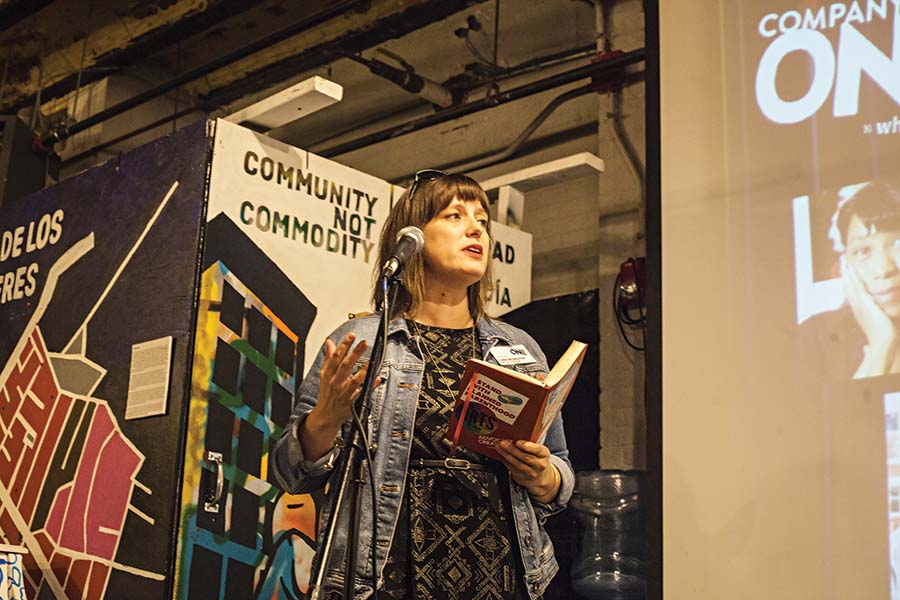For years Ilana M. Brownstein’s Twitter avatar was an illustrated phrenology chart. This tiny image of a human mind as a multicolored patchwork—representing to me the myriad things going on in that brilliant brain of hers—is what first drew me to Brownstein. It seemed to crop up in every social media conversation about new-play development or audience engagement. As a fellow theatremaker, what has kept me and many other theatre artists returning to Brownstein time and again is also embodied in the way she later interrogated the complex history of phrenology—the discredited study of the size and shape of the skull as reflections of what’s happening inside—and decided against having that image represent her. Brownstein is nothing if not thorough and deep, investigating everything. In this way, she is the consummate dramaturg.
To be a dramaturg with the Brownstein Approach (whether she admits it or not, this is a thing) is a formidable, comprehensive job. It is to be an artist of impact—to be a producerial, generative dramaturg, not merely a responsive, research-retrieving dramaturg. It is to be an artistically compelling theatremaker in her own right, an active participant in a rigorous play development process. As Brownstein put it to me, it is to think “carefully about the whole container of the work, the event of it, the connection of the theme of the play and the community.” It is to be as aware of and working on yourself as you would be with a play. When accepting her second Elliott Hayes Award for Outstanding Achievement in Dramaturgy in 2014 from Literary Managers and Dramaturgs of America (LMDA), Brownstein reflected, “A dramaturg has the power to be a curator, a facilitator, a teacher, an organizer, a distributor of resources both esoteric and logistical, a node around which a movement can happen, a driver of new forms, and a force for public good.”
This vision was also an organizing principle of the Playwrights’ Commons: the Freedom Art Retreat. Brownstein created this space because she “’turged” the Boston theatre ecology—as well as her own soul—and saw a need. She felt called to de-silo playwrights, dramaturgs, and designers from one another, and to promote new thinking around play development processes. Dramaturgs do not and cannot exist in a bubble; they must act and react; they must do.

“Ilana was always on my brain,” recalls Shawn LaCount, artistic director of Boston’s Company One Theatre (C1), where Brownstein serves as director of new work. LaCount knew her from her work at the Huntington Theatre Company in Boston, where she was literary manager from 2002 to 2008. Brownstein came to the Huntington directly from Yale School of Drama’s Dramaturgy and Dramatic Criticism MFA program. At the Huntington, in addition to serving as production dramaturg on numerous shows every season, Brownstein started the Breaking Ground Festival of New Play Readings and directed the Huntington Playwriting Fellows program, in which mid-career Boston-based scribes took part in a two-year paid residency comprising a writers’ collective with the theatre’s artistic staff, attending Huntington productions and events, and being eligible for reading and workshop opportunities. “Writers in Boston place value on her thoughtfulness and her generosity,” says LaCount.
In Company One’s early years, LaCount knew that he wanted Brownstein on his team. After dramaturging Lydia R. Diamond’s Voyeurs de Venus in 2008-09, she settled in for C1’s 2010-11 season and hasn’t left since. She and LaCount worked together for the first time in fall 2012 with Bengal Tiger at the Baghdad Zoo. “I found an artistic partner,” he says. “It was like having someone much smarter than I was in the room and someone the artists respected. The work was deeper for her presence.”
At C1, Brownstein mentored a corps of dramaturgs as it grew into the dramaturgically focused company it is today. For proof of the troupe’s investment in this work, look no further than the theatre’s staff directory: Other titles include connectivity manager & dramaturg, literary manager, documentation dramaturg, dramaturg & connectivity fellow, and connectivity associate. The team behind every C1 show includes both a lead dramaturg and an assistant, who each touch all areas of production.
“If you are a dramaturg,” notes Ramona Ostrowski, associate producer of the Boston-based HowlRound as well as a former C1 literary manager and dramaturg and Boston University student of Brownstein’s, “you are in every rehearsal, tech meeting, designing lobby environments, writing and designing programs, and creating engagement events around the production.”
Kirsten Greenidge, Playwright-in-Residence at Company One, calls this two-’turg approach a “deep dive into the world of the play and the playwright and the director, as well as the rehearsal room.” According to LaCount, C1 is producing bigger, scarier work because of Brownstein’s presence in the company. Her “doer” tendencies and the corps of dramaturgs have led to the creation of more new and varied opportunities for writers to hone their skills and have their work developed and produced.
And Brownstein was key in curating C1’s current season on the black male experience in the U.S.: Idris Goodwin’s HYPE MAN: a break beat play, Tarell Alvin McCraney’s Wig Out!, and the world premiere of Josh Wilder’s Leftovers (July 20-Aug. 18).

Brownstein couldn’t understand why American Theatre magazine wanted to profile her, of all people. Despite her collaborators’ accolades—“brilliant, passionate, caring, engaged” (LaCount), “a real ally” to artists (Goodwin), “If Ilana were a tree, she would be an oak” (Greenidge)—Brownstein is unfailingly humble. A vocal, energetic presence in rehearsal rooms, classrooms, conferences, social media, and street corners, Brownstein is otherwise an introvert who says she longs to escape to a cabin in the wilderness sans internet (most likely with the “loves of her life,” husband Chandran and son Bhaskar). Brownstein acts from an unrelenting, heartfelt compulsion to bring people together and create change.
“The thing that sustains me is that theatre is not just an art form,” she explains. “It’s a vehicle for empathy and humane connection. It comes to us through a history of ritual and spiritual practice, and though we’ve largely moved on from those structures, the roots remain.”
Brownstein is inexplicably predisposed to dramaturgy—or maybe not so inexplicably, given her background. She spent her first decade in a predominantly African American community in a South Side neighborhood of Chicago near Jackson Park, but commuted with her mother to Evanston, Ill., where she attended school with almost exclusively white children. Brownstein now appreciates what she learned about racial segregation and inequity at an early age.
At 10, her family relocated to the Clayton area of St. Louis, where she had “a very white, very Jewish experience.” This 180 from her life in Chicago instilled further lessons about social identity privilege. She began to question oppressive systems and structures earlier than many of her white peers, planting the seeds of her life’s mission: fighting for greater inclusion, representation, and justice.
Before taking up that fight in earnest, she wrestled with her own intellectual prowess: Throughout high school and most of college, she believed she wasn’t smart. Most of her close friends were skilled in science and math, and her arts-inclined friends in her circle pursued significant works of English literature, notoriously challenging works like Finnegans Wake, which left Brownstein staring at the page thinking, “Wha?!”
It wasn’t until her senior year in the directing program at the College of Wooster in Northeast Ohio when it struck her that she could do something those around her struggled to do: She could look at a script and determine how and why it worked, what the playwright was striving to do—in her words, “really understand the bones, muscle, and fat of how a play works.” It had never occurred to her that this was a skill. Now that she’s teaching dramaturgy and dramatic literature at the college level, Brownstein is asking herself: Are the skills of the dramaturg teachable, or are some of them unlearnable? Brownstein has been rethinking her pedagogy and coursework, turning it inside out.
“I want to know, what are my assumptions about how and why I teach what I teach?” she says. “‘What are the assumptions I make about what people bring in to learning how to be a dramaturg? Or thinking about dramatic literature and history as a genealogy of performance, and why we care about that and what it means to be a theatremaker today.”
Of course Brownstein wants to harness people’s natural analytical skills, but she recognizes that this is not everyone’s entry point into dramaturgy and criticism. While Brownstein feels the analytical skills of dramaturgy are vital, she’s aware it’s not everyone’s “natural intelligence” to approach processes like she does. So like the dramaturg she is, she’s questioning the whole container—including herself, its maker and producer.
As if she didn’t have enough to interrogate, since the birth of her son Brownstein has been asking questions of herself and the theatre field about practices that are unfriendly to families—particularly to mothers, and especially at the non-union level. As Brownstein sees it, the processes of creating, rehearsing, and performing plays aren’t designed for people with families. Individuals in decision-making positions are not always people who care for younger children, either because they don’t have kids or because they’re men with partners who primarily care for children. “Could meetings not be over dinner time?” she wonders. “Could we not rehearse the bulk of the day on a weekend day?”
She’s brought these questions to both Company One and LMDA. At C1, since Brownstein is not the only parent in the company, her inquiries have been met warmly and, when possible, led to changes. “Be flexible to the artists’ needs,” LaCount says of his approach. “We have the responsibility to make [the process] healthy for parents as much as we would anyone.”
For herself, the work-life balance question is not always easy to answer: In the first couple of years of Bhaskar’s life, she turned down offers that weren’t family-friendly. As a nursing parent, for example, she couldn’t go away to a theatre festival for two weeks; easy decision made. But, I wondered naïvely, could the repercussions really be that widespread or long-lasting? Well, consider that in 2014, as Brownstein told me, she was at a professional high point “in terms of the amount of invitations to work freelance, to adjudicate things, to be on panels, to win the [Elliott Hayes] award for a second time. I felt flow, professional flow. And then I got pregnant.” Since then it has been “a rough, rough climb out of that hole of productivity and professional high.”
A year after Bhaskar was born, she received “the offer,” a major job she’d hoped for. But she had to decline it; it simply wasn’t the time. The opportunity isn’t coming back. “I see peers getting opportunities that I’m not getting, and I think it’s because people perceive me as unavailable,” says Brownstein. “It’s hard to reconcile. But it’s a choice. I’m making a choice to be more available to my family.” She says she’s beginning to feel closer to “where I was in 2014,” but also feels “completely overworked and overcommitted. The professional dip is real. It is real hard.”
Along these lines Brownstein, Ostrowski, and a number of other female peers are connecting with the Parent Artist Advocacy League (PAAL) for the Performing Arts, and its founder, Rachel Spencer-Hewitt. I asked playwright Greenidge how parenthood has changed and strengthened Brownstein. She recalls a picture she had of Brownstein, wearing an apron, greeting Greenidge’s oldest child at a party at Brownstein’s home.
“What I love about this photograph,” Greenidge says, “is that it exemplifies some values Ilana has always brought into her work, from before she became a parent up to the present: that bringing people together to experience something communal is important; that children are real facts (sometimes theatre parents kind of have to hide that we have them or pretend they are no big deal); that preparation (as indicated by the apron) is half the battle to success.”
To me Brownstein embodies the wisdom of Chimamanda Ngozi Adichie from Dear Ijeawele, or A Feminist Manifesto in Fifteen Suggestions: Brownstein is her full self, honest and aware of the equal humanity of other people. In living this value and instilling it in others, she is shifting the landscape, a little bit every day and with every play.
Rachel Grossman is the ensemble director and a co-founder of dog & pony dc in Washington, D.C.


